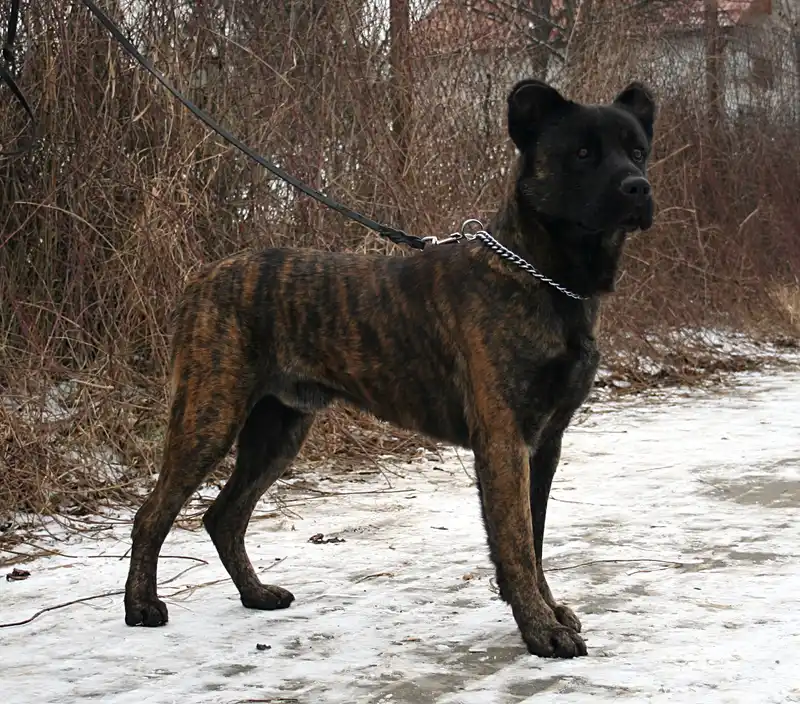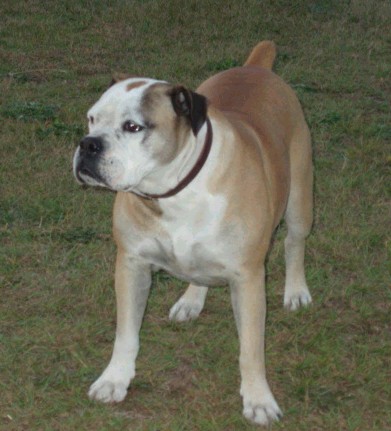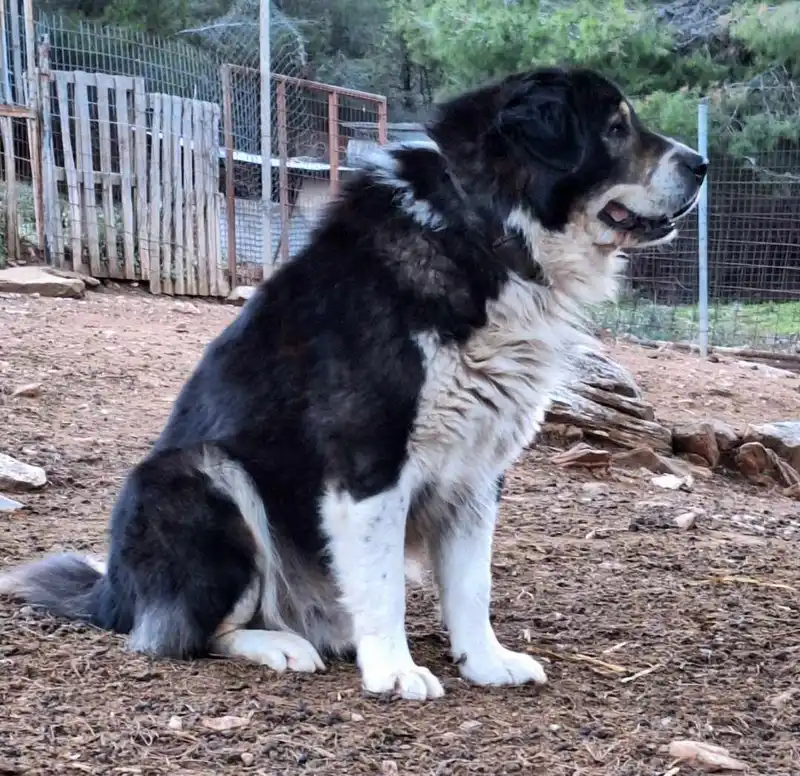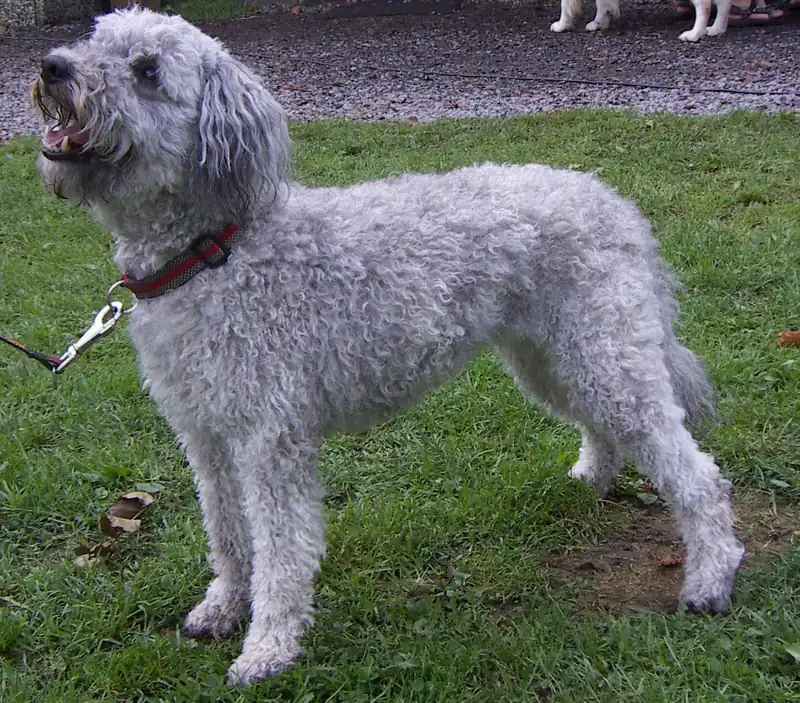Dogue Brasileiro
Also known as: Brazilian Dogo, Bull Boxer
The Dogue Brasileiro, or Brazilian Dogo, is a strong and loyal breed known for its guarding instincts and affectionate nature. Developed in Brazil, this medium-sized molosser-type dog excels as a family protector and companion.
⚡At a glance
🏆Best traits
Key Facts
- Height
- 51-61 cm
- Weight
- 23-43 kg
- Life Span
- 10 - 13 years
- Group
- Molosser
- Origin
- Brazil
- Shedding
- Low
- Exercise
- 60 min/day
- Best For
- Families, Active Owners
Overview
🐕Breed Overview
✨Key Traits
💡What Makes Dogue Brasileiro Special
The Dogue Brasileiro stands out for its unique combination of strength, agility, and affectionate temperament. This breed is not only a formidable guardian but also a loving companion, often forming strong bonds with family members.
Their intelligence and willingness to learn make them adaptable to various roles, from family protector to participant in dog sports. The Dogue Brasileiro's balanced nature allows it to be both playful and serious, providing a well-rounded personality that appeals to many dog lovers.
Their protective instincts are innate, ensuring they will always be vigilant in safeguarding their loved ones.
The Dogue Brasileiro, also known as the Brazilian Dogo, is a remarkable breed that embodies strength, loyalty, and versatility. Originating in Brazil, this medium-sized molosser-type dog was developed by Pedro Pessoa Ribeiro Dantas in the late 1970s through a cross between a Bull Terrier and a Boxer. The breed's foundation, a female named Tigresa, showcased exceptional qualities such as agility, strength, and a gentle temperament, leading to the establishment of the Bull Boxer line.
Recognized by the Confederação Brasileira de Cinofilia (CBKC), the Dogue Brasileiro has gained popularity for its impressive guarding abilities and affectionate nature towards its family. With a muscular and athletic build, the Dogue Brasileiro stands between 50 to 60 cm tall and weighs between 23 to 43 kg, depending on gender. The breed features a short to medium-length coat that is dense and harsh, available in various colors, including brindle, white, and red with black masks.
This breed is known for its alertness, fearlessness, and strong guarding instincts, making it an excellent protector for families. The Dogue Brasileiro is not only a loyal guardian but also a loving companion. They are obedient and gentle with their families, displaying a serious demeanor towards strangers.
Early socialization and training are essential to ensure they develop into well-rounded dogs. Their moderate exercise needs require at least 60 minutes of daily activity, including walks, playtime, and mental stimulation. In terms of health, the Dogue Brasileiro has a lifespan of approximately 13 years, with common health issues including hip dysplasia and obesity.
Regular veterinary check-ups and a balanced diet are crucial for maintaining their health. Overall, the Dogue Brasileiro is a unique breed that excels in guarding and companionship, making it a fantastic choice for families looking for a loyal and protective pet. With proper training, socialization, and care, this breed can thrive in various living environments, providing love and protection to its family.
🎉Fun Facts
Despite its strong appearance, the Dogue Brasileiro is known for its agility and athleticism, making it a versatile companion.
The Dogue Brasileiro is known for its exceptional guarding instincts and loyalty to its family.
This breed is often described as a gentle giant, being affectionate with children and family members.
Breed Characteristics
Family & Friends
Good Behavior
Get Up & Go
Household Harmony
Temperament & Personality
✨Key Traits
🐕Core Temperament
The Dogue Brasileiro possesses a calm and balanced temperament, characterized by loyalty and protectiveness. They are affectionate with their families and can be playful, especially with children.
While they are serious and watchful towards strangers, they do not exhibit aggression without provocation. This breed requires proper socialization to ensure they are well-adjusted and comfortable in various situations.
Their natural guarding instincts make them vigilant protectors, but they are also capable of forming strong bonds with their human companions.
💫Personality Profile
The Dogue Brasileiro is characterized by its loyal and affectionate nature towards its family. They are alert and protective, making them excellent guard dogs.
While they can be serious towards strangers, they are gentle and loving with their family members. This breed is known for its intelligence and eagerness to please, which makes training relatively straightforward when approached with positive reinforcement.
They enjoy being part of family activities and thrive on companionship, making them well-suited for families with children.
🔊Vocal Tendencies
The Dogue Brasileiro has a moderate noise level. They may bark to alert their owners of strangers or unusual occurrences, but they are not excessive barkers.
Their vocalizations are typically reserved for situations they perceive as threats or when they want attention. While they may express themselves through barking, they are generally calm and composed, making them suitable for families who prefer a quieter dog.
However, early training can help manage any barking tendencies, ensuring they only vocalize when necessary.
Affection & Social Traits
Warm and balanced socially — here’s how it shows up day to day.
Energy & Activity
Moderate, steady energy — great for matching your routine.
Communication Style
Generally quiet — a quick read on noise at home.
Care Requirements
🏃♂️Exercise Requirements
Daily Exercise
The Dogue Brasileiro, being an active and muscular breed, requires a moderate amount of exercise to maintain its physical and mental well-being. Ideally, an adult Dogue Brasileiro should engage in at least 60 to 90 minutes of exercise each day.
This can be broken down into two or three sessions, including brisk walks, playtime in a secure yard, or engaging in dog sports such as agility or obedience training. Puppies, while energetic, should have shorter, more frequent exercise sessions to avoid overexertion, while senior dogs may require gentler activities to accommodate their physical limitations.
Regular exercise not only helps manage their weight and supports cardiovascular health but also reduces the risk of behavioral issues stemming from boredom or pent-up energy. Insufficient exercise can lead to destructive behaviors, anxiety, and obesity, making it crucial for owners to prioritize their Dogue Brasileiro's activity needs.
Preferred Activities
🏠Living & Adaptability
Space Requirements
The Dogue Brasileiro thrives in environments where it has ample space to move and play. While they can adapt to apartment living if provided with sufficient exercise, they are best suited for homes with large, securely fenced yards.
This breed enjoys outdoor activities and needs room to run and explore. Owners in smaller living situations should ensure they can commit to regular outings to parks or open spaces.
Lack of adequate space can lead to frustration and behavioral issues, so it's essential to create an environment that caters to their energetic nature.
Climate Preference
🍲Feeding Guide
Schedule
Food Types
Portion Size
Special Nutritional Needs
The Dogue Brasileiro may require a diet rich in protein to support its muscular build and active lifestyle. It's important to monitor their weight to prevent obesity, which can lead to health issues. Regular veterinary consultations can help determine specific dietary needs, especially for puppies and seniors.
✨Grooming Requirements
Grooming Overview
The grooming needs of the Dogue Brasileiro are relatively low due to its short to medium-length coat. Regular brushing, at least once a week, helps remove loose hair and keeps the coat healthy.
Bathing should be done as needed, typically every few months or when the dog gets particularly dirty. Owners should also pay attention to the dog's ears, cleaning them regularly to prevent infections, and trim nails as necessary to keep them at a comfortable length.
Overall, the grooming routine is straightforward, making it manageable for most owners.
Care Schedule
Brush weekly; bathe as needed (every few months); trim nails every 2-4 weeks.
Health Profile
⚕️Health Care
Regular health care is essential for the Dogue Brasileiro's lifespan. Routine veterinary check-ups, vaccinations, and preventive treatments can help detect and address health issues early.
Owners should also be proactive in managing their dog's weight and providing a balanced diet to support their health throughout different life stages. Early detection of health problems can significantly improve the quality of life and longevity of the breed.
Health Issues Overview
⏳Average Lifespan
Genetic Factors
Genetics play a significant role in the lifespan of the Dogue Brasileiro. Responsible breeding practices that prioritize health and temperament can help reduce the risk of hereditary health issues. Potential owners should seek reputable breeders who conduct health screenings and maintain genetic diversity within the breed to promote longevity and overall health.
Living Conditions
The lifespan of a Dogue Brasileiro can be influenced by various environmental factors, including housing conditions, climate, and social interactions. Dogs living in spacious, secure environments with access to outdoor activities tend to be healthier and happier.
Regular exercise and mental stimulation are crucial for their overall well-being. Additionally, a stable and loving home environment can contribute positively to their lifespan, while exposure to stress or neglect can lead to health issues.
🏥Common Health Issues
Hip Dysplasia
Warning Signs
🔬Diagnosis
Veterinarians typically diagnose hip dysplasia through physical examinations and X-rays.
💊Treatment
Medications, weight management, and in severe cases, surgery.
📝Management Tips
Maintain a healthy weight, provide joint supplements, and engage in low-impact exercises to support joint health.
Obesity
Warning Signs
🔬Diagnosis
Diagnosis is based on physical examination and body condition scoring.
💊Treatment
Dietary changes, increased exercise, and veterinary guidance.
📝Management Tips
Monitor diet, provide regular exercise, and avoid overfeeding.
🛡️Preventive Care
🔬Hip Evaluation
Hip Evaluation assesses the dog's hip joints for dysplasia and other abnormalities, crucial for preventing joint issues.
📅 Annually after 1 year of age.
🔬Wellness Check
A general health screening that includes blood tests to check for common health issues and overall wellness.
📅 Annually.
Training
🧠Intelligence & Trainability
💪Work Drive
The Dogue Brasileiro has a moderate work drive, benefiting from tasks that engage both its physical and mental capabilities. Activities such as obedience training, agility courses, and interactive play can help satisfy this breed's need for stimulation.
Given their history as guard dogs, they thrive when given a job to do, whether it's protecting their family or participating in dog sports. Without sufficient mental and physical engagement, they may become bored, leading to undesirable behaviors.
Owners should aim to provide a variety of activities to keep their Dogue Brasileiro happy and fulfilled.
⚠️Training Considerations
The Dogue Brasileiro can exhibit some behavioral challenges, particularly if not properly socialized from a young age. Common issues include wariness of strangers and potential aggression if they perceive a threat to their family.
To mitigate these challenges, early socialization is crucial, exposing the dog to various people, environments, and experiences. Consistent training using positive reinforcement methods can help establish boundaries and encourage appropriate behavior.
Additionally, providing mental stimulation through interactive toys and training exercises can prevent boredom and reduce the likelihood of destructive behaviors.
📝Training Tips
Training a Dogue Brasileiro requires patience and consistency. Positive reinforcement techniques, such as treats and praise, work best to motivate this breed. Start with basic obedience commands, gradually introducing more complex tasks as the dog becomes more confident.
Socialization should be a priority, ensuring the dog is comfortable around different people and animals. Regular training sessions should be kept short and engaging to maintain the dog's interest. It's essential to establish a strong bond with the dog, as they respond well to owners who demonstrate leadership and confidence.
Enrolling in obedience classes can also provide valuable socialization opportunities and guidance for first-time owners.
History & Heritage
📜Origin Story
The Dogue Brasileiro's story begins in the late 1970s when Pedro Pessoa Ribeiro Dantas, a dedicated Bull Terrier breeder, was approached by a neighbor to crossbreed his Bull Terrier with a Boxer. The resulting litter produced a female puppy named Tigresa, who would become the foundation of the breed.
Tigresa's impressive physical attributes and temperament led Dantas to explore further breeding opportunities, resulting in the establishment of the Bull Boxer line. Over the years, Dantas meticulously bred these dogs, focusing on their guarding instincts and affectionate nature, ultimately leading to the formal recognition of the Dogue Brasileiro as a distinct breed in Brazil.
The breed has since gained popularity, with a growing number of breeders and enthusiasts dedicated to preserving its unique qualities.
⏳Development History
The Dogue Brasileiro was developed by Pedro Pessoa Ribeiro Dantas in the late 1970s in Caxias do Sul, Brazil. The breed originated from a cross between a Bull Terrier and a Boxer, resulting in a dog named Tigresa, who exhibited exceptional qualities such as strength, agility, and a gentle temperament.
Recognizing the potential of this crossbreed, Dantas continued to breed these dogs, eventually establishing a new line known as the Bull Boxer. Over the years, the breed was refined through selective breeding, incorporating traits from the American Staffordshire Terrier while maintaining the original Bull Boxer characteristics.
The Brazilian Bull Boxer Club was founded in 1986, and the breed received official recognition from the CBKC in 1999, with a standardized breed description published in 2007.
🛡️Purpose & Historical Role
Originally bred for guarding and companionship, the Dogue Brasileiro has evolved into a versatile breed known for its protective instincts and loyalty to its family. Its historical role as a guard dog has made it a popular choice for families seeking a reliable protector.
The breed's gentle nature towards children and affectionate demeanor have also made it a beloved family companion. Today, the Dogue Brasileiro is utilized primarily as a guard dog, but its versatility allows it to excel in various roles, including participation in dog sports and as a loyal family pet.
🏺Cultural Significance
The Dogue Brasileiro holds a unique place in Brazilian canine culture, representing a blend of strength, loyalty, and versatility. Developed in the late 20th century, this breed reflects Brazil's rich history of dog breeding, particularly the influence of the Bull Terrier and Boxer.
The breed's recognition by the Confederação Brasileira de Cinofilia (CBKC) highlights its importance in Brazilian dog shows and competitions, where it is celebrated for its guarding abilities and affectionate nature. The Dogue Brasileiro has become a symbol of pride for many Brazilian dog enthusiasts, showcasing the country's dedication to developing functional and family-oriented breeds.
Conservation Status
The breed exists today and isn’t classified as extinct.
Less widespread; more likely to be region-specific or niche.
This breed is less common but has stable populations in certain regions.
?Frequently Asked Questions
Is the Dogue Brasileiro good for apartment living?
The Dogue Brasileiro can be moderate when it comes to apartment living. With adequate daily exercise and mental stimulation, apartment life can work, but they would benefit from more space. Regular walks and interactive play sessions are important for their well-being.
How much does a Dogue Brasileiro shed?
The Dogue Brasileiro sheds minimally compared to many other breeds. While no dog is truly hypoallergenic, this breed produces less loose hair than average. Routine brushing will help manage the little shedding they do.
Are Dogue Brasileiros easy to train?
The Dogue Brasileiro can be moderate when it comes to training. They can learn commands and routines with consistent effort, though they may sometimes show a stubborn streak. Patience, positive reinforcement, and regular practice sessions will yield the best results.
How long do Dogue Brasileiros live?
The average lifespan of a Dogue Brasileiro is 10 - 13 years. Lifespan can be influenced by genetics, diet, exercise, and overall health care. Regular veterinary check-ups and a healthy lifestyle can help your Dogue Brasileiro live a long and happy life.
Is the Dogue Brasileiro good with kids?
Yes, the Dogue Brasileiro generally does well with children. They are patient and affectionate, making them a solid family dog. As with any breed, supervision during interactions with young children is always recommended.
How much exercise does a Dogue Brasileiro need?
The Dogue Brasileiro is a high-energy breed that needs approximately 60 minutes of exercise daily. They thrive with vigorous activities such as running, hiking, or interactive games. Without adequate exercise, they may develop behavioral issues from pent-up energy.
Is the Dogue Brasileiro good with other pets?
The Dogue Brasileiro can be moderate around other pets. They can get along with other animals when properly introduced and socialized from an early age. Gradual introductions and positive associations will help build harmonious relationships.









